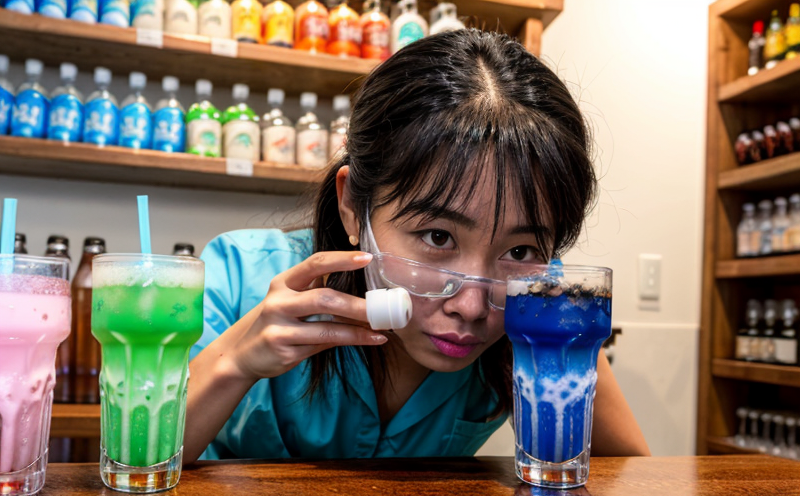Codex Alimentarius Pathogen Compliance Testing in Juices
In the fast-moving world of food and beverage manufacturing, ensuring compliance with global regulatory standards is paramount. The Codex Alimentarius Commission sets international food safety standards that are recognized by numerous countries around the globe. For the juice industry, Codex Alimentarius provides a framework for pathogen testing to ensure product safety and quality.
The Codex Alimentarius has specific guidelines for Listeria monocytogenes, E. coli O157:H7, Salmonella spp., and other pathogens that can pose significant health risks if present in food products like juices. This service focuses on testing juice samples to ensure they meet the stringent pathogen limits set by Codex Alimentarius.
The primary challenge for manufacturers is not just meeting these standards but understanding how to prepare specimens, which instruments to use, and what the acceptance criteria are. Our laboratory specializes in this area, providing a comprehensive service that includes specimen preparation, analysis using advanced instrumentation, and detailed reporting tailored to meet Codex Alimentarius requirements.
Our team of experts ensures that every test is conducted under strict quality control measures, ensuring accurate results. The testing process involves several critical steps: sample collection, preservation, inoculation, incubation, and detection. Each step requires precision and attention to detail to ensure the integrity of the final report.
The Codex Alimentarius guidelines are not just about compliance; they represent a commitment to consumer safety and product quality. By adhering to these standards, manufacturers can build trust with consumers and regulators alike. Our laboratory’s expertise in this area allows us to offer clients peace of mind, knowing that their products meet the highest global standards.
Our comprehensive service also includes training for our clients on how to prepare specimens correctly and interpret results. This knowledge is invaluable for quality managers, compliance officers, R&D engineers, and procurement teams who need to ensure their processes align with international standards.
Applied Standards
| Standard Code | Description |
|---|---|
| ISO 16865-3:2014 | Detection and enumeration of L. monocytogenes in foodstuffs by the use of enrichment broths followed by plating on chromogenic agar. |
| ASTM E2927-16 | A Guide for sample preparation, inoculation, and testing of juice products for L. monocytogenes. |
| EN 385:2008 | Detection methods for E. coli O157:H7 in food. |
| IEC 62444-3:2019 | Guidelines for the preparation of samples and testing procedures for juice products containing Salmonella spp.. |
The Codex Alimentarius is integral to these standards, providing a harmonized approach to food safety that ensures consistency across different regions. Our laboratory adheres strictly to these guidelines to ensure accuracy and reliability in our testing results.
Scope and Methodology
The scope of Codex Alimentarius pathogen compliance testing in juices is broad, covering several critical pathogens that can compromise product safety. The primary focus is on Listeria monocytogenes, a bacterium that can cause listeriosis, especially dangerous for pregnant women, the elderly, and those with weakened immune systems.
For E. coli O157:H7, our testing ensures that products do not contain this potentially deadly strain of bacteria, which can lead to severe illness if consumed. Salmonella spp. is another critical pathogen tested for, as it can cause salmonellosis and a range of gastrointestinal symptoms in consumers.
The methodology involves several key steps:
- Sample Collection: Fresh juice samples are collected from production lines or storage facilities.
- Inoculation: Samples are inoculated with specific media suitable for the pathogen being tested.
- Incubation: The samples are incubated under controlled conditions to allow pathogens to grow and be detected.
- Detection: Advanced microbiological techniques, including PCR and serology tests, are used to detect specific pathogens.
- Reporting: Detailed reports are generated that include the results of each test, ensuring compliance with Codex Alimentarius guidelines.
This comprehensive approach ensures that every juice product is thoroughly tested for pathogen presence, providing peace of mind for manufacturers and consumers alike.
International Acceptance and Recognition
- The results of Codex Alimentarius-compliant testing are internationally recognized by countries including the United States, Canada, Australia, New Zealand, and numerous European Union member states.
- Our laboratory’s certification ensures that clients can trust our results to be accepted in these markets without additional testing or scrutiny.
- Codex Alimentarius compliance is a requirement for many international certifications and accreditations, making it essential for global brands.
- The standards are widely accepted due to their robustness and reliability, ensuring consistent product quality across different regions.
By adhering to these stringent testing protocols, our laboratory ensures that clients’ products meet the highest safety standards recognized globally. This recognition not only enhances market access but also builds consumer trust in the brand’s commitment to safety and quality.





